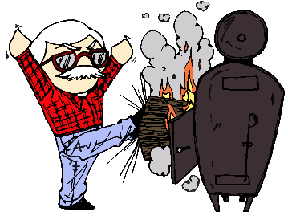Fay Butler Fab/Metal Shaping
Whose Decision Is It Anyways?
|
 |
Following my discussion of the “path of a craftsman”, I would like to talk about the decisions we make during our work. A craftsman is a state of mind as a problem solver. Problem solving requires the ability to accurately retrace our steps. This accurate information should be based on solid science. Often it is based on our past experience. Our past experience coupled with good science is where true knowledge is based. But what if our decisions are being made by others for us? I propose that without considerable thought, many of our decisions are not our own. They are proposed and promoted by others who very well might have good intentions yet whose agenda is different from our own. In an extreme case, we might well be relying on inaccurate decisions of others, and we might not even know it. |
We must become critical thinkers. When our choices become more of what we are deciding and not those of others, I believe we will make the best decisions to fit our needs. There are three common areas that as a craftsman we constantly make decisions on. Those are related to the materials, tools and processes. Let me briefly illustrate each of these areas and how they relate to our trade, and how decisions might not be our own. The first area is materials. What should we be using for the products we want to build? Should we choose steel or aluminum, which are two of the most common material choices? If we are capable of determining which one will be the best choice, than which alloy of each should we use? In sheet steel we have principally the carbon content affecting the strength. Then we have the refining process that this low carbon very formable material was produced in. That is either “killed” or “semi-killed”. Then we have surface finish, grain size and direction as a consideration. If we are talking about aluminum which has no common alloying element, it is broken into heat treatable and non-heat treatable alloys? Which should we choose? The American Iron and Steel Institute that represents the steel industries in the USA would certainly prefer you to use steel, while the Aluminum Association representing the aluminum industry that sets up the standards for aluminum world wide would like you to use aluminum. The second area is the tools. You first might choose hand tools, which would probably be some sort of hand held hammer. Hammers for years have been made out of heat treated alloy steel, yet recently in this trade plastic hammer heads have become available. If you move to power tools, an air operated unit might be considered, or maybe a wheeling machine or even some sort of powered mechanical energy source. And this energy needs to be transferred through some sort of contact which can be traditional hardened alloy steel or like the hand hammers, this new plastic material? On the third subject of processes, how are we making this decision? For example if you choose aluminum and you shaped it with some sort of hand hammer, how are you going to weld the material together? The possible choices for welding might be using an electric current, such as the TIG process or it could be the less expensive gas welding using oxygen and acetylene. The manufacturers of electric welding machines would like to see you use one of their machines and others would like to see you use gas welding. The metal shaping industry to my knowledge is the only industry that promotes gas welding as an alternative to electric power sources, and I wonder if any reading this can list pros and cons on either method? Are these pros and cons rooted in science or are they decisions being made by others? I could certainly continue on, although I think you get the idea. The Socratic approach named after the philosopher and educator Socrates who lived in Athens Greece around 450 BC believed in the pursuit of truth. He said to “question the questions and answers”. To find the truth meant to go 3 to 5 questions deep. When you are digging deeper for more proof, only then could the real truth be found. So I propose to you, when you come to a decision, what are you basing it on? Is it based on sound science? Can you back your decisions up? If you can not answer these basic questions than maybe your answer is flawed. That does not mean that you cannot solve the problem, it’s just the solution might not be the best. And worse it might be deeply flawed. As Socrates said, “Question the answers” and then I say, “make sure your decisions are your own.” If you have a question you'd like to ask Fay, this is the place to do it. Just click here to send an email. If you want to share your question and Fay's answer with the world on this page, please indicate that along with your question. Otherwise, we will respect your privacy and respond privately. |
|
©2005-2007 Fay Butler